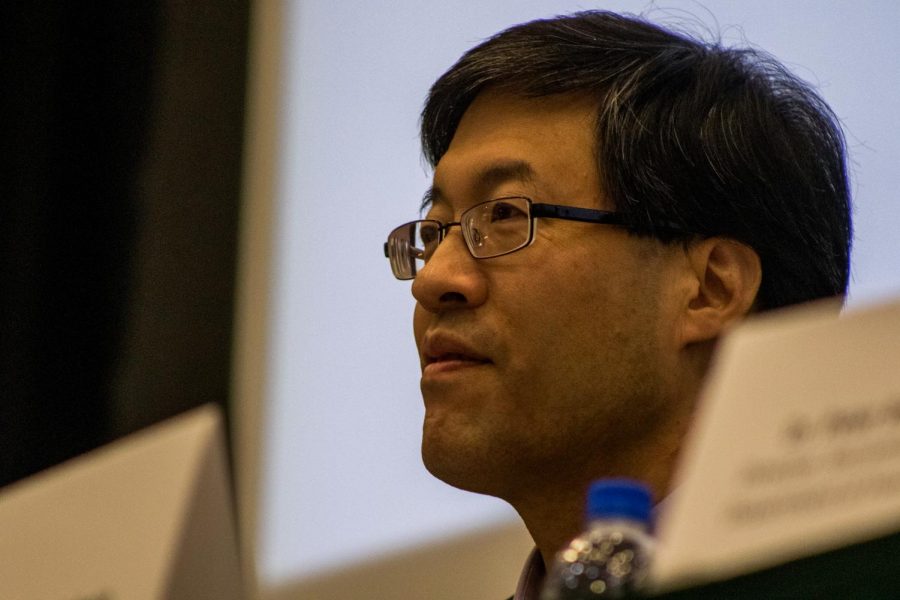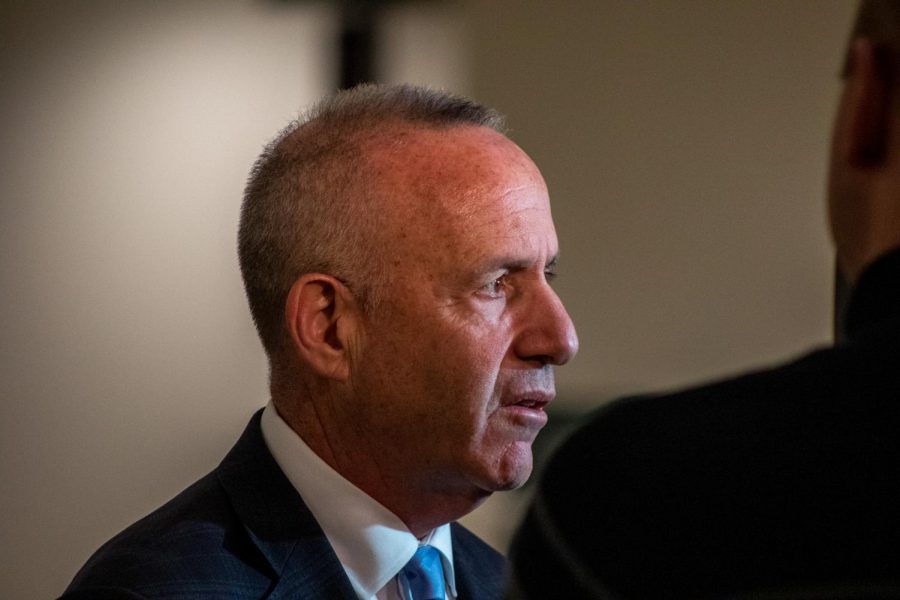Sac State hosts community forum discussing Asian American discrimination, coronavirus
Politicians, university faculty discuss xenophobia and health safety
Democratic California Senator Richard Pan explains information about the novel coronavirus and medical advice to prevent contamination at Sac State’s University Union on Wednesday, March 4
March 4, 2020
Students and faculty gathered Wednesday evening in Sacramento State’s University Union Ballroom for a community forum regarding the discrimination against Asian American and Pacific Islander communities amid the coronavirus outbreak.
Along with a panel of law enforcement and health experts, Sac State President Robert Nelsen and Sacramento Mayor Darrell Steinberg spoke at the event.
One of the primary themes of the event focused on addressing misinformation about COVID-19 through social media. Criminal justice major Mark Mojada said he’s seen a lot of discriminatory comments online.
“With what I’ve seen online, I think it opens the door for discrimination against the Asian community because of how rapidly (misinformation) is spread,” Mojada said. “I’ve seen on social media people get beat up for just being Asian.”
Story continues below gallery
Nelsen addressed the audience in an attempt to alleviate concerns about coronavirus, commenting on how the relatively low turnout “means we’re not all frightened, it means we’re going forward.”
RELATED: Sac State president announces no campus closure despite Sacramento coronavirus patient
One of the panelists, California Senator Richard Pan, discussed the state of emergency declared by California Gov. Gavin Newsom. He emphasized how it was used to grant the state more power over preventing the spread of COVID-19.
“I want to assure people that (the state of emergency) was not (enacted) because the risk level has changed, the risk is still low,” Pan said. “This allows the state to be able to take certain steps and responsibilities.”
Story continues below tweet
Dr. Richard Pan discusses how @CAgovernor has declared a state of emergency in California to give the state greater power in fighting #COVIDー19 @TheStateHornet pic.twitter.com/SjjzlvK4Li
— Gavin Rock (@gavinjrnal) March 5, 2020
Though Steinberg left early, he spoke about the need for acceptance and tolerance toward Asian Americans and Pacific Islanders while dealing with coronavirus, as well as maintaining composure.
Archana Maniar, an associate professor of medicine at UC Davis, said she is encouraged with Californian testing, but reminded the audience that we are still in flu season.
“As you all know, it’s very difficult by symptoms alone to discern whether somebody has influenza or whether they have novel coronavirus,” Maniar said.
Story continues below tweet
Dr. Archana Maniar: “I’ve been inundated from patients and healthcare providers about if they’re at risk…during active flu season, we have to think beyond coronavirus” @TheStateHornet pic.twitter.com/ymKZBlwoUX
— Gavin Rock (@gavinjrnal) March 5, 2020
Several of the panelists addressed the fears in Asian American communities as a result of stigmatization. Pan spoke of the consequences when a community is stigmatized, especially during a public health emergency.
“When you have a condition like coronavirus, you do not want people to go underground,” Pan said. “You do not want people to be frightened to report they have symptoms because they’re afraid they’re going to be attacked, or bullied or socially rejected.”
Story continues below tweet
Dr. Pan on why it is dangerous to stigmatize communities of different ethnic or cultural backgrounds @TheStateHornet pic.twitter.com/GpwCF7h3bG
— Gavin Rock (@gavinjrnal) March 5, 2020
Nursing student Olivia Tran said her professors told her and her peers that students will be coming to them due to the sensationalism surrounding coronavirus.
“We’re in the hospitals for our clinicals and we don’t need to freak out all the time,” Tran said. “This is the time everyone has respiratory infections, and all the steps (Sac State) is telling everyone to take in precaution are basic things you should be doing during flu season.”
While Tran said she believes Sac State is taking the right steps in addressing the coronavirus, humanities major Isis Zarate-McCoy said she is less reassured.
“I think there’s much more panic than they care to address right now, and I realize that there’s good in not addressing it as it makes it seem not that big of a deal,” Zarate-McCoy said. “But they do need to address it better.”





































































































































